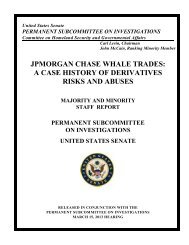JPMORGAN CHASE WHALE TRADES: A CASE HISTORY OF DERIVATIVES RISKS AND ABUSES
JPMORGAN CHASE WHALE TRADES: A CASE HISTORY OF DERIVATIVES RISKS AND ABUSES
JPMORGAN CHASE WHALE TRADES: A CASE HISTORY OF DERIVATIVES RISKS AND ABUSES
You also want an ePaper? Increase the reach of your titles
YUMPU automatically turns print PDFs into web optimized ePapers that Google loves.
66<br />
declined, the SCP book also lost value. 418 As the OCC explained it to the Subcommittee, general<br />
market movements went against the CIO in January 2012. 419<br />
The result was that the SCP experienced nine straight days of losses in the second half of<br />
420<br />
January. The OCC told the Subcommittee that the ratio of days with losses versus days with<br />
profits was already “ugly” at that point – long before credit positions added in February and<br />
March accelerated the SCP losses. 421 Under U.S. generally accepted accounting principles<br />
(GAAP), the value of derivatives, including credit derivatives, has to be recorded at their fair<br />
market value – “marked to market” – at the close of each business day. 422 That meant the<br />
decreased value of the SCP’s short position had to be recorded on the CIO’s books, even if no<br />
derivative instruments were actually traded during the day. In a January 26, 2012 email, the<br />
head trader in charge of the SCP book prepared a report for CIO managers indicating that the<br />
SCP book has already lost $100 million and predicting further losses of $300 million. 423<br />
It was while these losses were piling up that critical decisions were made that ultimately<br />
resulted in the much more massive SCP losses JPMorgan experienced. According to Javier<br />
Martin-Artajo, head of the CIO’s equity and credit trading operation, it was then that the head of<br />
the CIO’s International Office, Achilles Macris, told him that the SCP book was no longer<br />
needed to hedge tail risk at the bank and should be reshaped, primarily to put a stop to the losses<br />
424<br />
it was experiencing. Mr. Martin-Artajo later told the JPMorgan Chase Task Force<br />
investigation that, despite Mr. Macris’s comment, he still viewed the SCP book as a hedge. 425<br />
any event, the issue in late January was whether to sell off the short positions; take no action<br />
when positions naturally expired; purchase long positions; or take some other action to reshape<br />
the SCP.<br />
The evidence indicates that CIO management gave only cursory attention to the option of<br />
leaving the SCP book as-is, since the book would have continued to lose value during the credit<br />
426<br />
market rally, as was the case for hedges and short positions generally. According to Mr.<br />
418 Subcommittee briefing by JPMorgan Chase (8/15/2012) (Jeanette Boot); Subcommittee interview of Michael<br />
Sullivan, OCC (8/30/2012). See also 2013 JPMorgan Chase Task Force Report, at 26 (stating that in the fourth<br />
quarter of 2011, the SCP held an overall net short position).<br />
419 Subcommittee interview of Michael Sullivan, OCC (11/7/2012).<br />
420 See Synthetic Credit Profit and Loss, OCC-SPI-00000298, and chart tracking the SCP’s daily profit and loss<br />
reports in Chapter 4.<br />
421 Subcommittee interview of Michael Kirk, OCC (8/22/2012).<br />
422 See Section 3.3: Securities and Derivatives of the FDIC Risk Management Manual of Examination Policies, at 6<br />
and 16. http://www.fdic.gov/regulations/safety/manual/section3-3.pdf.<br />
423 1/26/2012 email from Bruno Iksil, CIO, to Julien Grout, CIO, “credit book last version,”conveying “Core Credit<br />
Book Highlights,” JPM-CIO-PSI 0000161.<br />
424<br />
JPMorgan Chase Task Force interview of Javier Martin-Artajo, CIO (partial readout to Subcommittee on<br />
9/6/2012). Irvin Goldman, the CIO’s Chief Risk Officer, told the Subcommittee that the decision to stop using the<br />
SCP as a hedge was actually made in December 2011. Subcommittee of Irvin Goldman, CIO (9/15/2012). See also<br />
JPMorgan Chase Task Force Report, at 29 (indicating CIO trader was told that the“focus in managing the [SCP] at<br />
that point should be on profits and losses”).<br />
425<br />
JPMorgan Chase Task Force interview of Javier Martin-Artajo, CIO (partial readout to Subcommittee on<br />
9/6/2012).<br />
426<br />
Hedges, like insurance, cost money to keep in place. The CIO traders, however, appeared unwilling to absorb the<br />
cost of this “insurance,” trying instead to position the SCP book to produce gains rather than reflect the costs of<br />
maintaining credit loss protection.<br />
In



